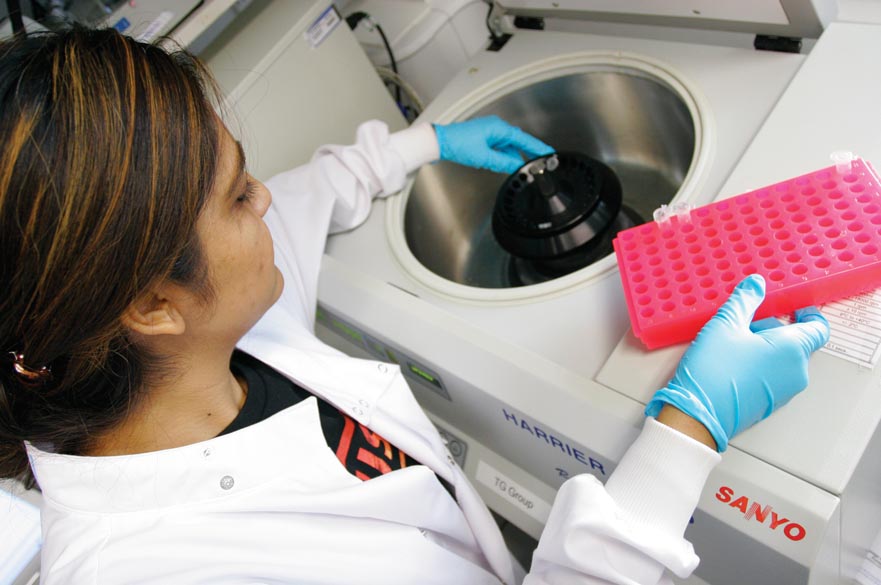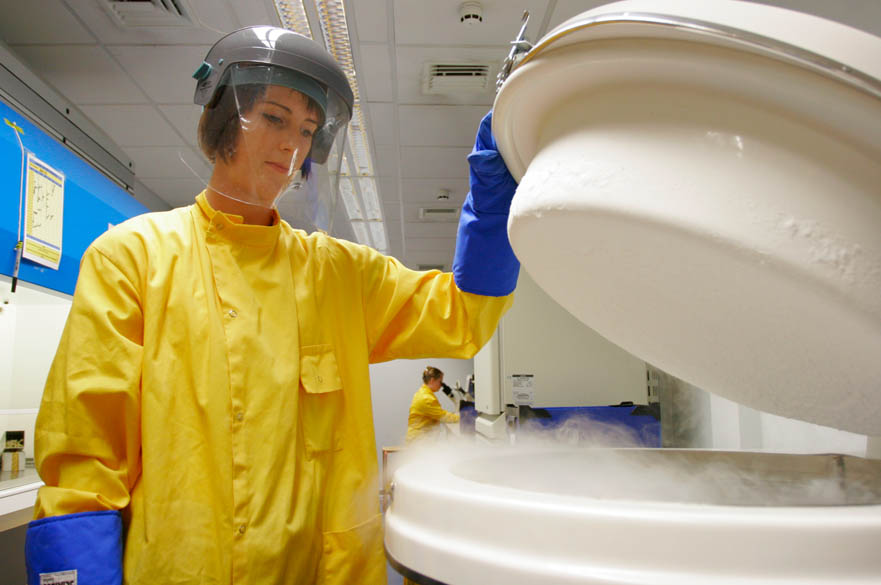Neuropharmacology MSc
About this course
Designed to give you the theoretical and practical skills needed to enter a career in neuropharmacology either in an academic institution, a research institute or in the industrial/business sector.
This stimulating course will give you the opportunity to develop your practical skills through an extended laboratory-based research project. It will also enable you to develop an ability to plan a research project, apply effective data analysis skills to your results, and to communicate your findings in an articulate and professional manner.
This course is ideal if you are:
- a recent graduate and looking for the professional skills needed to obtain a job in a neuropharmacology research related area or a career in academic research into neuropharmacology.
- working for a neuroscience company in a or pharmacology research-related area and want a masters-level qualification to give you a competitive edge.
- interested in using cutting-edge facilities to develop your own learning and research.
What you’ll study
This Neuropharmacology Masters is made up of six core modules and a research project. If you are part-time or a sandwich student, you will continue to study the second year from the modules listed below.
Research Methods and Bioethics (20 cp)
This module encourages you to think beyond your own subject, and interact accordingly. You'll gain a solid foundation in literature review, research design and planning, data analysis and a poster presentation by focusing your studies on a related ethical issue. Ethical issues in research will also be explored, as you discover when and how to obtain ethical clearance in accordance with ethical governance at NTU.
Cell Biology and Physiology (20 cp)
Develop your understanding of basic cellular function within physiology, and gain an appreciation of cellular systems. Modern pharmacological concepts and techniques are introduced as well as studying cell organisation, gene expression, metabolism, and physiological systems.
Cognitive Neuroscience (20 cp)
In this module, you’ll explore the current research and fundamental concepts in cognitive neuroscience, including perception, brain structure and organisation, memory, and the functional basis of certain human neurological and psychiatric illnesses. You’ll analyse and practice some of the most up-to-date research techniques used in industry.
Techniques in Macromolecular Analysis (20 cp)
The aims of this module are to provide an advanced knowledge and understanding of the techniques that can be used to isolate and purify macromolecules, and the approaches that can be used to track, study and predict macromolecular structure and function. You'll explore a range of current topics, and their application to macromolecular analysis. These topics will include the macromolecular analysis of proteins, protein purification programs and simulations, and protein bioinformatics.
Neurophysiology (20 cp)
A number of hot topics in molecular and cellular neuroscience will be selected from current scientific literature. These topics include subjects such as neuronal pathways involved in the expression of behaviour, neural degeneration, neurotoxicity and the recent advances in our understanding of certain neurological and psychiatric illnesses.
Pharmacology (20 cp)
In this module, you’ll see how genes can influence our physiology, and hence our pharmacological response to drugs used to treat pathological conditions. You’ll develop the concept of tailoring therapeutic drugs as the future of drug design, enabling physicians to prescribe personalised medical treatments based on an individual’s genome.
Research Project (60 cp)
In consultation with a supervisor at NTU, you'll select a research topic comprising an original, defined research question (or series of such questions), and develop a written research proposal for the Project. You'll then present this proposal as part of the Research Methods and Bioethics module.
We regularly review and update our course content based on student and employer feedback, ensuring that all of our courses remain current and relevant. This may result in changes to module content or module availability in future years.
How you're taught
You will be assessed by a variety of methods including:
- Research project
- Written assignment
- Case studies
- Poster and oral presentations
- Laboratory reports
- Formal examinations
- Skills portfolio
You will learn through:
- Lectures
- Guided reading supported by the University’s virtual learning portal
- Seminars
- Workshops
- Written and oral presentations
- Research reports
- Attendance regular research seminar
- Developing your skills portfolio
Study hours
Contact hours for a 20 cp modules are typically around 50 hours, with a further 150 hours expected from you for directed and independent study.
Research informed teaching
By daring to think differently our research is tackling real-world issues. The subjects you will study with us are informed by our research so you can be sure your knowledge will be cutting-edge in your field. In the last Research Excellence Framework (REF 2021) - the UK's system for assessing the quality and impact of research in universities - we’re proud that 99% of NTU’s Allied Health Professions, Dentistry, Nursing and Pharmacy submission was assessed to be world-leading or internationally excellent.
Learn a new language
Alongside your study you also have the opportunity to learn a new language. The University Language Programme (ULP) is available to all students and gives you the option of learning a totally new language or improving the skills you already have. Find out more about the ULP.
How you're assessed
Coursework (71%) and written (29%)
Contact hours
Lectures / seminars / workshops (20%) and independent study (80%)
Careers and employability
There are a wide range of career opportunities within neuropharmacology. You will work with leading academics on your course, so you will have gained important academic and professional skills necessary to help you obtain employment in this field. At the end of the course, you will also have developed many transferable skills that will make you more attractive to potential employers in related areas of molecular bioscience and neuropharmacology.
The Research Project and/or Placement will give you the skills you need to follow a career in research and development.
Skills portfolio
You will gather together relevant practical skills throughout laboratory classes producing a training record. This can be presented to potential employers as proof of competence in a laboratory setting. It also provides you with experience of managing what is essentially a personal development portfolio, which is now a standard tool for monitoring progression and performance in a scientific career as well as out in the sector.
Employability Team
The University's Employability team has an enviable reputation for helping our graduates find employment and offers individual consultations. Sessions are available to all students at NTU on CV writing and interview technique.
The Sandwich-route course offers you the opportunity to take a one-year placement or several smaller placements. If you start this course in September / October then you will complete your placement following your taught modules and research project. If you start in January you will complete one term of taught modules and your project then go on placement before returning to NTU for your final term of modules.
Placements
NTU is one of the most employment-focused universities. Increasingly, employers want to recruit graduates who have real-world work experience. That’s why all of our courses, across every subject area, offer you a work experience opportunity. Our experts help build and support your future with a range of career programmes and events.
The school of Science and Technology will work closely with you to help find a placement and strengthen your CV and interview techniques. You'll be supported and assessed throughout your placement year and will write a reflective report and diary at the end of your placement. When you successfully complete your placement and submit your placement report, you will be eligible to receive an additional award of a Postgraduate Diploma in Professional Practice.
Please note that placements are not guaranteed and the process is competitive through an application and interview process.
If you take the sandwich route, and start this course in September / October you will complete your placement following your taught modules and research project. If you start in January you will complete one term of taught modules and your project, then go on placement before returning to NTU for your final term of modules.
Our recent students have taken placements across a wide range of companies including the NHS, The Frozen Ark Project and Public Health England. They secured varied roles such as Biobank Intern, Lab Technician and Volunteer Mentor.
Re:search Re:imagined
To us, research is about more than writing papers and proposing new ideas. By daring to think differently, we’re disrupting the research landscape and finding the answers to the questions that really matter. From conservation management to sustainable farming, we’re inspiring the brightest minds to rise up and find solutions to some of the most significant global challenges facing society.
NTU Enterprise
You'll also have the opportunity to turn your ideas into a viable business with help from NTU Enterprise, NTU's purpose-built Centre for Entrepreneurship and Enterprise, a support centre to help students create, develop and grow their own businesses.
Campus and facilities
You’ll mainly be studying in the Interdisciplinary Science and Technology Centre (ISTeC) and Rosalind Franklin Buildings with access to facilities including our extensive SuperLab, with space for almost 200 students.
Our self-contained, community-focused Clifton Campus has been designed to keep students busy between lectures. Catch-up with your coursemates in the Pavilion’s barista café and Refectory; brainstorm group presentations in chic and stylish study spaces; enjoy some proper R&R in The Point, home of our Students’ Union. The campus also hosts the multimillion-pound Clifton Sports Hub, offering great options for everyone — whatever your interests, and however competitive you’d like to get!
You’re also right next to the bright lights of Nottingham — one of Britain’s top 10 student cities, and one of Europe’s top 25. All through termtime, a dedicated on-campus bus service will get you to the heart of the action (and back) in under 25 minutes. You’ll find a city stuffed with history, culture, and well-kept secrets to discover at your leisure: enjoy lush green spaces, galleries, hidden cinemas and vintage shopping by day, and an acclaimed food, drink and social scene by night.
Entry requirements
UK students
Academic entry requirements: 2.2 honours degree or equivalent in an biological subject, neuroscience, neuropsychology or pharmacology.
Applicants with relevant employment experience or qualifications will also be considered.
Additional requirements for UK students
There are no additional requirements for this course.
Other qualifications and experience
We welcome applications from students with non-standard qualifications and learning backgrounds and work experience. We consider credit transfer, vocational and professional qualifications, and any work or life experience you may have.
You can view our Recognition of Prior Learning and Credit Transfer Policy which outlines the process and options available, such as recognising experiential learning and credit transfer.
Getting in touch
If you need more help or information, get in touch through our enquiry form.
International students
Academic entry requirements: 2.2 honours degree or equivalent in an biological subject, neuroscience, neuropsychology or pharmacology.
Applicants with relevant employment experience or qualifications will also be considered.
We accept equivalent qualifications from all over the world. Please check your international entry requirements by country.
English language requirements: See our English language requirements page for requirements for your subject and information on alternative tests and Pre-sessional English.
Additional requirements for international students
There are no additional requirements for this course.
English language requirements
View our English language requirements for all courses, including alternative English language tests and country qualifications accepted by the University.
If you need help achieving the language requirements, we offer a Pre-Sessional English for Academic Purposes course on our City campus which is an intensive preparation course for academic study at NTU.
Other qualifications and experience
We welcome applications from students with non-standard qualifications and learning backgrounds and work experience. We consider credit transfer, vocational and professional qualifications, and any work or life experience you may have.
You can view our Recognition of Prior Learning and Credit Transfer Policy which outlines the process and options available, such as recognising experiential learning and credit transfer.
Sign up for emails
Sign up to receive regular emails from the International Office. You'll hear about our news, scholarships and any upcoming events in your country with our expert regional teams.
Getting in touch
If you need advice about studying at NTU as an international student or how to apply, our international webpages are a great place to start. If you have any questions about your study options, your international qualifications, experience, grades or other results, please get in touch through our enquiry form. Our international teams are highly experienced in answering queries from students all over the world.
Policies
We strive to make our admissions procedures as fair and clear as possible. To find out more about how we make offers, visit our admissions policies page.











